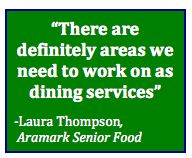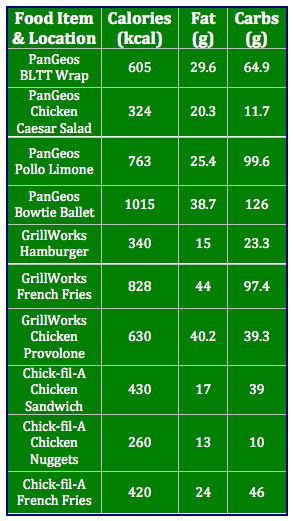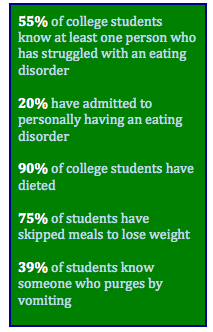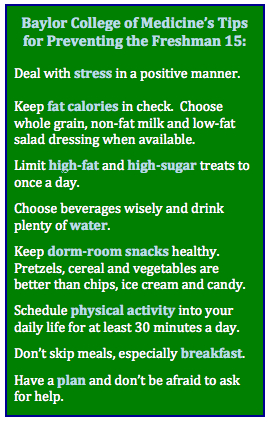What are colleges and universities doing to provide healthy dining options for students and what are the physical and emotional impacts of the freshman fifteen?
by Amy McLeod
You know what I’m talking about. The Octagon Rush. On any given Friday at about 12:30 p.m., the line for the beloved Bowtie Ballet extends out of Pangeo’s, wraps around the entrance of Octagon Café and ends up anywhere between Fireside Lounge and the Admissions Office. The line to get a chicken steak provolone and French fries from GrillWorks has hungry students packed like sardines inside Octagon. Maybe the realization that the delicious Bowtie Ballet has 1,015 calories and the perfectly seasoned French fries from GrillWorks have 44 grams of fat would curb the appetites of those hungry students.
When the deep-fried chicken nuggets and waffle fries from Chic-fil-A are the healthiest things a student can find to eat, there’s a big problem. Many of dining options in Octagon Café and throughout the rest of Elon University are unhealthy. The key questions: Is the nutrition of the food important? What are those in charge doing to make the dining options healthier for Elon students? And what physical and emotional implications are students experiencing due to the lack of healthy dining options?
Students from neighboring schools speak out.
In an informal survey taken of approximately 250 students from Elon, University of North Carolina at Charlotte, University of North Carolina at Chapel Hill, North Carolina State University and Furman University, 88 percent of students said that they have gained weight since arriving at college. Nearly 65 percent of those surveyed said unhealthy dining options were to blame for the weight gain.

results of an informal survey regarding weight gain in college

What does Aramark think about its job as dining service?
Laura Thompson Aramark senior food service director at Elon University spoke candidly about the job that Aramark venues at Elon are doing in terms of the nutritional value of food being served.
“If you want me to be honest,” Thompson said, “I’m not sure that our menus are 100 percent nutritionally sound. I think we definitely have room for improvement. I think we offer a lot of good options but definitely have room to improve the options that we can add to give students more healthier options.”
Aramark recipes are all created at the corporate level and then passed down to individual schools and universities. Individual school menus are then created at a local level. Elon’s dining services typically use all of the recipes that the corporate level provides in order to supply students with as much variety as possible. That means, however, that not all options offered can be “healthy.”
“I think we’ve just let it slide,” Thompson said. “None of our managers come from a nutrition background. I think it’s just something we need to educate our managers and our employees who are preparing the food. It’s a big education process.”
While the health of students is a priority for Elon, there are limitations that dining services face as they plan meals and try to appeal to and cater to all students.
“I’d love it if we could be healthier,” said Grace Patterson, one of the GrillWorks workers at Octagon Café, “but when we’re trying to make four chicken provolone sandwiches, seven cheeseburgers, three grilled cheese and nine orders of fries for hungry students we don’t have time to think really about nutrition.”
Ideas for the future
Some students don’t care or prefer to eat calorie-laden foods. The plethora of dining options that Elon offers allows Elon to provide options for all students, whether they are football players who need to eat 8,000 calories a day or sorority girls who are trying to stay fit for Spring Break.
 “We can look at every location,” Thompson said, “and hopefully offer something that is nutritionally sound to the students who are looking for that but we can still offer the French fries for the student who doesn’t really care what they eat.”
“We can look at every location,” Thompson said, “and hopefully offer something that is nutritionally sound to the students who are looking for that but we can still offer the French fries for the student who doesn’t really care what they eat.”
Right now, Aramark focuses on having a balanced menu but sometimes nutrition is the aspect that gets sacrificed.
“I think we focus on giving a well-balanced program but if you walk into a dining hall are you going to find a well-balanced meal every single day?” she asked, “I don’t think so and that’s something that’s an initiative of ours to work on this summer when we re-tool our menus.”
Along with offering a balanced selection of dining options, Aramark has and will continue to attempt to provide options for those with food allergies or other restrictions. As the gluten allergy, known as celiac disease, becomes more prevalent, Aramark is trying to accommodate students suffering with that disease in their menus.
“I got really excited when I saw that Colonnades advertised gluten-free pizza,” said Elon junior Ben Kaufman. “But when I requested it, the lady pulled out a gluten-free wrap and put sauce and cheese on it. Not exactly what I had in mind. It’s great that they have options, but I wish there were more and better options because this allergy is being diagnosed a lot more recently and it’s very limiting.”
Aramark recognizes the increasing number of students who are have a gluten allergy and are actively trying to provide those students with gluten-free options.
“We are hoping to expand that program more because we are seeing celiac disease being more and more diagnosed and more of our students coming on campus are having that issue so we’re hoping that this summer we can expand that option for those students.”
Every summer, managers revisit their menus and make changes in order to make the dining options healthier, better and more diverse. During this summer’s re-vamping process, Elon’s dining services will also be employing a new initiative of Aramark’s called “Just4U.” This initiative will provide signage in dining halls that will indicate if the food is low calorie or low fat, for example. This will help students make informed decisions about the food they are eating, giving them more opportunity to control what they are eating.
The Aramark Web site has this to say about its new Just4U initiative:
“Just4U® point-of-service menu identifiers make it easy to find selections that are lower in fat, lower in calories, lower in carbohydrates, vegetarian or organic. In addition, Just4U® ‘Eat Well Selections’ make it easy to find foods that offer several nutritional benefits in one menu item for business diners that are concerned about limiting the calories, fat and sodium in their diets. These new identifiers simplify the decision-making for busy customers who want great tasting, healthy choices that fit their own personal preferences.”
This signage will provide important information quickly about dining options. Currently, most nutritional information is available on the Elon Dining Services Web site but is not available at the dining halls or markets.
“This summer we hope to have a big overhaul of our menus,” Thompson said. “It will be something that will be emphasized at the beginning of the summer when our managers are into their menu production to make sure that with every meal that you have that there is a nutritionally sound option.”
Listen to Laura Thompson talk about some things Elon is doing to improve dining services,
Mental and emotional impacts of the Freshman 15
New initiatives are great but what about the impact that has already been felt by college students at Elon and across the country?
“We learned in my educational psychology class about the crazy things that can happen to students in college,” said sophomore Sam McMillan. “So many people develop eating disorders and begin to suffer from depression. And a lot of times it can all be traced back to weight gain.”
A 2006 survey conducted by the National Eating Disorders Association (NEDA) measured the awareness and prevalence of eating disorders on college campuses across the country. The survey revealed shocking statistics about eating disorders in college students.
Sixty-three percent of the 1,002 students surveyed felt their lives had been personally impacted by an eating disorder. Nearly 20 percent admit to having personally had an eating disorder at some time. Of that 20 percent, only 25 percent had ever sought treatment.
Students coming into a new environment, meeting all new people and establishing an entirely new lifestyle can be physically, mentally and emotionally affected by small changes and hard adaptations, said McMillan.
“Being on their own for possibly the first time and facing a heavy academic load can make the first year of college very stressful,” said Dr. Karen Cullen, a behavioral nutrition researcher at Baylor College of Medicine in Houston. “Many college freshmen respond to stress by eating.”
The real story of one Elon student who has felt the effects of the Freshman 15
One Elon junior has suffered from an eating disorder since her freshman year. Without the support and watchful eye of her parents, she stopped paying attention and caring about what she ate.
“I was always very fit and very thin because I was always playing a sport,” says Heidi Williams (name changed to provide anonymity). “Whether it was soccer, swimming, or track, I was always doing something. When I got to school and didn’t have a coach or my parents keeping me in check, I let myself go.”
Williams recalls spending a lot of time in the all-you-can dining halls and enjoying the late night options available on campus. Having what seemed like endless meal plans and endless options, Williams found herself eating more than was healthy and more than was necessary.
“I remember going home my freshmen year for Thanksgiving,” Williams said. “It was the first time I had been home and my mom just kind of stared at me. The first thing my sister said was, ‘So I guess you’re enjoying the food at school.’ That hit me hard and I’ve never forgotten it. I hadn’t let myself realize how much weight I had gained until my family wouldn’t let me ignore it anymore.”
The realization that she had gained the “freshman 15” in her first few months on campus sent Williams into a dieting and exercising frenzy that turned into an eating disorder.
“I started skipping meals and throwing up what I would eat,” Williams recalled, the subject visibly difficult to discuss. “I started running every day, anything I could do to get back to my normal size and weight. I’ve been fighting it since then, December of my freshman year.”
Tips for avoiding the dreaded Freshman 15
We want to believe the freshman fifteen is a myth, one of those “it’ll never happen to me” kinds of things. But it’s real and the convenience of dining options on college campuses coupled with the lack of healthy dining options makes the freshman fifteen more real than most people would like to believe.
“Coming into school last year, I was aware of the freshman fifteen. I had definitely heard about it but I wasn’t worried. Maybe I should have been,” said Elon sophomore Meredith Reedy laughing. 
It doesn’t have to be inevitable. There are steps that can be taken and preventative measures that can keep the dreaded freshman fifteen away.
According to the Baylor College of Medicine, there are several things students can do that will keep the pounds off.
First, dealing with stress positively. It’s always important to limit foods high in fat, fat calories and sugar in check. Drink lots of water and get plenty of sleep.
Keep dorm-room snacks healthy. It’s easy to have candy or chips but snacking on vegetables or pretzels are much healthier options. Schedule physical activity into the daily routine. If it doesn’t become habit, it won’t seem important. Eat all meals; skipping will not cause quicker weight loss. Plan ahead. Know how you plan to stay healthy and don’t let yourself get out of control.
